Related Research Articles

Peter Lindsay Weir is an Australian retired film director. He is known for directing films crossing various genres over forty years with films such as Picnic at Hanging Rock (1975), Gallipoli (1981), The Year of Living Dangerously (1982), Witness (1985), Dead Poets Society (1989), Fearless (1993), The Truman Show (1998), Master and Commander: The Far Side of the World (2003), and The Way Back (2010). He has received six Academy Award nominations. In 2022 he was awarded the Academy Honorary Award for his lifetime achievement career. In 2024, he received an honorary life-time achievement award at the Venice Film Festival.

Joan à Beckett Weigall, Lady Lindsay was an Australian novelist, playwright, essayist, and visual artist. Trained in her youth as a painter, she published her first literary work in 1936 at age forty under a pseudonym, a satirical novel titled Through Darkest Pondelayo. Her second novel, Time Without Clocks, was published nearly thirty years later, and was a semi-autobiographical account of the early years of her marriage to artist Sir Daryl Lindsay.
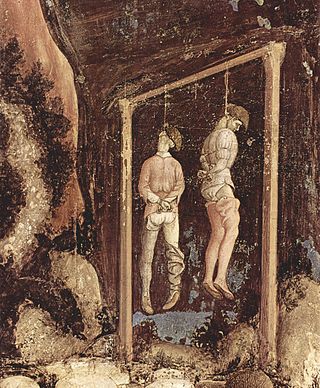
Hanging is killing a person by suspending them from the neck with a noose or ligature. Hanging has been a common method of capital punishment since the Middle Ages, and is the primary execution method in numerous countries and regions. The first known account of execution by hanging is in Homer's Odyssey. Hanging is also a method of suicide.

Hugo Wallace Weaving is a British actor. He is the recipient of six Australian Academy of Cinema and Television Arts Awards (AACTA) and has been recognised as an Honorary Officer of the Order of Australia. Born in Colonial Nigeria to English parents, he has resided in Australia for the entirety of his career.
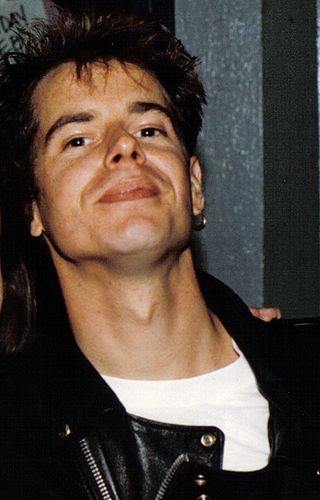
Paul Newell Hester was an Australian musician and television personality. He was the drummer for the band Split Enz for their last year together from December 1983 to December 1984, and co-founding member and drummer of the band Crowded House.
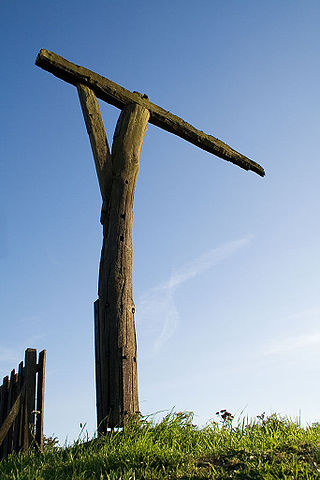
Gibbeting is the use of a gallows-type structure from which the dead or dying bodies of criminals were hanged on public display to deter other existing or potential criminals. Occasionally, the gibbet was also used as a method of public execution, with the criminal being left to die of exposure, thirst and/or starvation. The practice of placing a criminal on display within a gibbet is also called "hanging in chains".

Ronald Joseph Ryan was the last person to be legally executed in Australia. Ryan was found guilty of shooting and killing warder George Hodson during an escape from Pentridge Prison, Victoria, in 1965. Ryan's hanging was met with public protests by those opposed to capital punishment. Capital punishment was abolished in all states by 1985.

The Old Melbourne Gaol is a former jail and current museum on Russell Street, in Melbourne, Victoria, Australia. It consists of a bluestone building and courtyard, and is located next to the old City Police Watch House and City Courts buildings, and opposite the Russell Street Police Headquarters. It was first constructed starting in 1839, and during its operation as a prison between 1845 and 1924, it held and executed some of Australia's most notorious criminals, including bushranger Ned Kelly and serial killer Frederick Bailey Deeming. In total, 133 people were executed by hanging. Though it was used briefly during World War II, it formally ceased operating as a prison in 1924; with parts of the jail being incorporated into the RMIT University, and the rest becoming a museum.
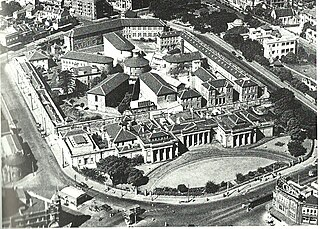
The Darlinghurst Gaol is a former Australian prison located in Darlinghurst, New South Wales. The site is bordered by Darlinghurst Road, Burton and Forbes streets, with entrances on Forbes and Burton Streets. The heritage-listed building, predominantly designed by New South Wales Colonial Architect Mortimer Lewis, was closed in 1914 and has subsequently been repurposed to house the National Art School.

The Myall Creek massacre was the killing of at least 28 unarmed Aboriginal people in the Colony of New South Wales by eight colonists on 10 June 1838 at the Myall Creek in the north of the colony. Seven perpetrators were convicted of murder and hanged.

The Barlow and Chambers executions were the hangings on 7 July 1986 by Malaysia of two Westerners, Kevin John Barlow and Brian Geoffrey Shergold Chambers (Australian) of Perth, Western Australia, for transporting 141.9 g (5.01 oz) of heroin.
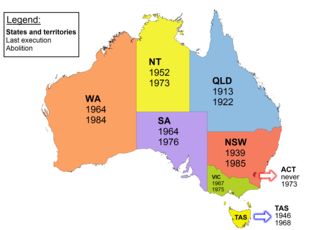
Capital punishment in Australia has been abolished in all jurisdictions since 1985. Queensland abolished the death penalty in 1922. Tasmania did the same in 1968. The Commonwealth abolished the death penalty in 1973, with application also in the Australian Capital Territory and the Northern Territory. Victoria did so in 1975, South Australia in 1976, and Western Australia in 1984. New South Wales abolished the death penalty for murder in 1955, and for all crimes in 1985. In 2010, the Commonwealth Parliament passed legislation prohibiting the re-establishment of capital punishment by any state or territory. Australian law prohibits the extradition or deportation of a prisoner to another jurisdiction if they could be sentenced to death for any crime.
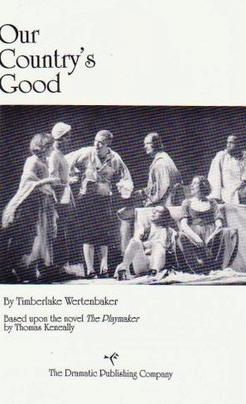
Our Country's Good is a 1988 play written by British playwright Timberlake Wertenbaker, adapted from the Thomas Keneally novel The Playmaker. The story concerns a group of Royal Marines and convicts in a penal colony in New South Wales, in the 1780s, who put on a production of The Recruiting Officer.
Michael Pyke is a Canadian retired dual-code football player, who was a professional Australian rules footballer with the Sydney Swans in the Australian Football League (AFL).
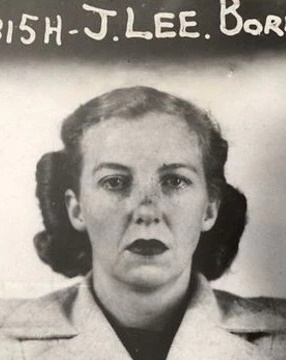
Jean Lee was an Australian murderer who, together with her lover Robert Clayton and accomplice Norman Andrews, was convicted for the 1949 killing of William 'Pop' Kent, an SP bookmaker from the Melbourne suburb of Carlton. The victim was bound to a chair, tortured with the aim of finding hidden money, and finally strangled. All three were convicted and sentenced to death in March 1950. They were hanged eleven months later at Pentridge Gaol. Lee was the last woman to be executed in Australia.

Van Tuong Nguyen, baptised Caleb, was an Australian from Melbourne, Victoria convicted of drug trafficking in Singapore. A Vietnamese Australian, he was also addressed as Nguyen Tuong-van (阮祥雲) in the Singaporean media, his name in Vietnamese custom, as well as in most Asian customs.
Craig Potter is a former Australian rules footballer who played with Sydney and Brisbane Bears in the Victorian/Australian Football League (VFL/AFL).
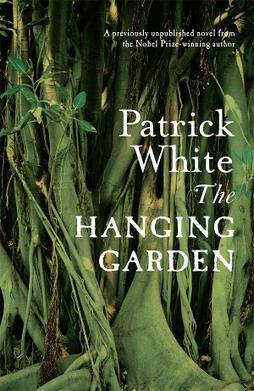
The Hanging Garden is an unfinished novel by Australian author and Nobel Prize winner Patrick White. The novel was published on April 2, 2012 by Random House Australia. The published edition of the novel is estimated to be about a third of what the ultimate length of the finished product would have been and was discovered on White's desk after his death.
The Man They Could Not Hang is a 1934 Australian film directed by Raymond Longford about the life of John Babbacombe Lee, whose story had been filmed previously in 1912 and 1921. These silent films were called "one of the greatest box-office features that ever came out of this country." The sound film was not as successful.

Lum You —sometimes spelled Lum Yu—was an immigrant Chinese laborer and convicted murderer in the Pacific Northwest. He is famous for being the only person to have been legally executed in Pacific County, Washington, and for his death row prison break supposedly arranged by the very jailers charged with his captivity.